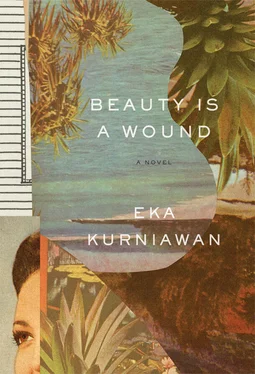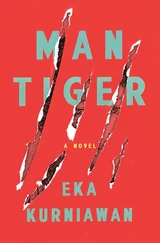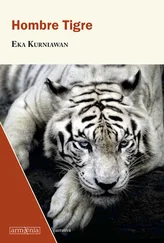They were pressed together so tightly that Comrade Kliwon could feel the girl’s breasts, so soft and warm, and strands of her hair, fluttering in the breeze, brushed across his face. When her friends arrived, relieved, Comrade Kliwon gently pushed the girl away, and that was when he saw her unique beauty, with that old-fashioned, gentle, and natural grace, her hair in two braids, her closed eyes with the tapering eyelashes of a nymph, her slim nose, her finely-carved ears, her lips curled in a small frown, her full cheeks, and then he realized the girl had fainted, and had perhaps been unconscious from the very first moment she’d leapt into his arms.
With the help of her friends, he set the unconscious girl down in a chair. After attempting to revive her, he stopped a horse-drawn cart making slow progress across the weeds and along the bathing springs near his hut and Comrade Kliwon told them to take the unconscious girl home and the girls then crowded together on top of the cart.
But even after they’d disappeared around the bend and the clopping hooves could no longer be heard, Comrade Kliwon could still smell the scent of the girl’s hair, feel the soft touch of her breasts, and the effect of her mystical beauty. He tried to chase away those feelings, telling himself he had to work hard for the future of the Party, but that warmth simply would not go, even when he busied himself with burying the rabid dog in the thicket, and even after waking his friends because the rice was ready.
Bedtime made him suffer all the more. The morning’s events haunted him, and he realized that the schoolgirl’s face was somehow vaguely familiar — maybe he even knew her name. Still feeling the warmth of her body, he tried to remember how he knew her. The girl was about fifteen years old, so he definitely had never dated her. And then, once he remembered who the girl was, he suffered all the more — he indeed had seen her face, and he even knew her name, and had known it ever since she was six years old. In fact, in the year before he went to Jakarta, he’d seen her almost every day. He immediately tried to banish all memories of the girl’s warmth from his body, to erase the soft touch of her breasts, but it was hopeless.
“Oh,” he said quite pitifully, “her name is Adinda and she’s Alamanda’s younger sister.”
He finally decided to get up. The fishermen had emerged from their houses and some were checking their nets, fixing any parts that had been torn by thrashing fish, and others were walking toward the city in search of entertainment. After ensuring the nets stretched out to dry next to their hut were in good condition, Comrade Kliwon went to bathe in the spring. The bathing spot had an open-air spigot protected only by pandan shrubs. There was just a big barrel with a small hole corked with an old rubber sandal. But indeed Comrade Kliwon didn’t like bathing under a showerhead where the water dribbled down like piss, and he preferred to scoop and pour the water directly onto his body like this.
It turned out that he couldn’t escape that girl, as if her family had been destined to hound him as long as he lived. Before he had finished bathing, Karmin shouted that two young girls were looking for him. After he had gotten dressed, with his hair still wet, he found two girls in the front room, looking at the portraits of Marx and Lenin and the hammer and sickle on the wall.
“Thank you for helping me,” said Adinda with a small embarrassed bow. She wasn’t at all like Alamanda — her face was calm and innocent and shy.
“You ran faster than the dog,” said Comrade Kliwon. “You could have run him to death with such speed.”
“He would have bitten me,” said Adinda, “because I would have fainted.”
For the time being, the disturbance that girl caused could be overcome by his Party duties. He had to attend to the complaints of the Fishermen’s Union regarding the operation of Shodancho’s fishing vessels. Comrade Kliwon tried to lead a group of fishermen in an action one morning. As the large boats were lining up in the port market to lower their catch, Comrade Kliwon and his group stood facing them. He told one of the captains that they would stand there until there was a guarantee the huge vessels would cease their operations in the traditional fishing grounds.
“I don’t care if all your fish rot,” he began, and of course ended with, “Workers of the world, unite!”
The workers on the large ships stood relaxed on the rails, with no intention of clashing with their fellow villagers, and without caring that the fish might rot, because after all they weren’t paid in fish. Meanwhile the market buyers, who should have felt cheated, stayed quiet seeing how many fishermen were there, with their bodies as strong as baby whales. The truly bothered and infuriated ones were of course the captains and officials on Shodancho’s ships, but even they didn’t move to confront the Fishermen’s Union men. One tense hour passed, with agitations and a choir singing the Internationale , and fishermen linking arms in a line to face whatever came down from the ship, man or fish.
Comrade Kliwon was fairly certain of victory. The fish would quickly begin to rot and, if the vessels did not comply, then in the following days they would continue to catch rotting fish. But before the blocks of ice on the vessels melted and the fish truly began to stink, some policemen and an army battalion arrived. After an anxious moment, the fishermen decided to fight, but then the soldiers began shooting their rifles into the sky and they ran away frantic. Comrade Kliwon was forced to order a retreat.
All this should have been enough to make him forget Adinda, but it was not. That girl appeared in the crowd of fishermen, and he saw her.
The hut where he lived with Karmin and Samiran served as the Fishermen’s Union headquarters, so it was open to everyone. They held their frequent meetings, and talked on and on about anything and everything there, and he couldn’t hardly just ask the girl to leave if, on her way home from school, Adinda showed up with a number of her friends.
Adinda was good at speaking English, which wasn’t too unusual in Halimunda since so many foreigners came there to visit. Comrade Kliwon had a library that delighted book lovers; most of the volumes were philosophy and politics, but there were also English storybooks that Adinda enjoyed. When Comrade Kliwon awoke from his afternoon nap, he would quite often find the girl sitting at the large table, right under the photo of Lenin, solemnly reading. She would look up at him for a moment and smile as if to say, Sorry I came in without asking , and Kliwon would give her a cup of tea nervously, though the girl would say, Thank you, I can get it myself , but by then Comrade Kliwon would have quickly gone out back to the well to tremble.
Adinda read many books there. She read all the Gorky, Dostoevsky, and Tolstoy novels he had. All of them were published by the Foreign Languages Publishing House in Moscow, and sent through the Party. She read local novels too, and translated ones put out by Yayasan Pembaruan, the publisher of the Party, and the books of Balai Pustaka, which belonged to the government.
Comrade Kliwon never asked her to leave, but he did avoid her as best he could. Two things made him suffer when she was near: first, Adinda elicited a painful nostalgia for Alamanda, and second, seeing Adinda transported him back to their warm embrace that had so intoxicated him. He busied himself even further with the Fishermen’s Union business, discussing the failure of their first action against Shodancho’s ships. He organized Union cadres to infiltrate the ships and work there to win over the laborers. It would take some time, but he believed that communists were the most patient creatures on the face of the earth.
Читать дальше











